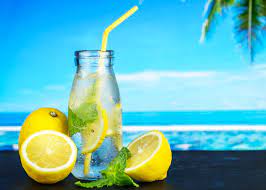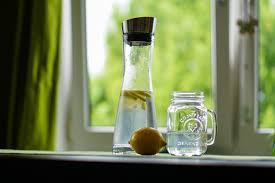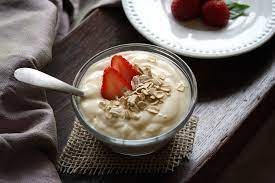How to cope up with dehydration this summer season?
4 minuteRead

Dehydration is a common problem in the summer. This is the time of year when the majority of people suffer from heatstroke and even pass out due to dehydration. Here are a few good recommendations and methods you can use to avoid the detrimental effects of summer heat on health and dehydration this season. Because eating not only keeps you safe from the scorching summer sun and dehydration, but it also boosts your overall health and immunity. So, to get you started, here are a few fundamental principles!
Know how to Deal with Dehydration
The water in your body evaporates as the temperature rises, leaving you fatigued and lethargic. When the amount of water lost through perspiration and excretion exceeds the amount of water or drinks taken, this is known as dehydration. When water is lost from the body, the fluid and salt balance in the body is also disrupted. Dehydration symptoms such as headaches, dizziness, weakness, and a dry mouth appear at this point. If neglected, they may result in fainting and other significant health issues. As a result, more attention must be exercised during the summer to avoid heatstroke and dehydration, particularly among the elderly and children.
Instead of pulling up your socks after a summer heat stroke, it's best to prevent it with simple home remedies. And what could be more healthful than making a few dietary tweaks to battle summer heat and thirst? Here are six of the most effective and easiest natural ways to battle the summer heat and avoid dehydration.
- Increase your water intake
Yes! One of the best, most effective, and simplest strategies to combat dehydration during the summer is to drink enough water. The body's water levels are depleted as a result of the scorching heat outside. This causes a fluid imbalance in the body, which increases your chances of getting migraines, lightheadedness, or fainting. As a result, make increasing your water consumption a part of your daily routine during the summer.
Take small sips of water at regular intervals throughout the day instead of guzzling enormous volumes of water all at once. This allows you to stay hydrated all day long. Drink at least two liters of water per day during the summer.
- Consume water-rich fruits and vegetables.
Drinking water on a regular basis fills your stomach and prevents you from eating. Summer heat and dehydration, on the other hand, are insufficiently combated by water. Because the body loses salt and minerals along with water, it is vital to consume hydrating fruits and vegetables on a regular basis. These fruits also provide a variety of nutrients while keeping your body cool.
Instead of chips and burgers, serve a salad with fresh fruits and vegetables like grapes, watermelon, muskmelon, cucumber, papaya, and oranges to beat the summer heat.
- Juices that are good for you (non carbonated drinks)
During the summer, we all pack our refrigerators with cool drinks and carbonated beverages. This, however, is not a good idea because these drinks deplete key nutrients while also making you thirstier.
Instead, drink healthy, freshly prepared fruit or vegetable juices to quench your thirst. Coconut water, lauki juice, carrot and beet juice, or detox cocktails are all options (fruit slices that are soaked in water overnight). Dehydration can also be treated at home with drinks steeped with common herbs or spices like ginger, jeera, or mint. You can also go with the more traditional method and drink a glass of lemon water, which is both detoxifying and antimicrobial.
- Drink plenty of water before, during, and after your workout.
It is a good habit to acquire to exercise every day, but not at the price of your health. Staying hydrated is the easiest way to avoid problems while exercising, particularly on a hot summer day. After a strenuous workout, the body loses fluids and electrolytes. Therefore, it's vital to replace those lost minerals and water to avoid dehydration. Maintaining hydration will assist you in sticking to your workout schedule and avoiding dehydration. In the long term, avoiding chemical-laden and sugary drinks after exercise will do more harm than good.
- Make your own popsicles.
Who doesn't enjoy ice cream on a hot summer day? Isn't just thinking about it making you want one right now? Why not create your own popsicles this summer? Yes, making your own popsicles is not only a healthier alternative to ice cream, but it also allows you to reap the fruits' nutritional benefits. All you need are fresh fruits, herbs, sugar, and water. Combine the chopped fruits, herbs, sugar, and water in a blender, then process until smooth and pour into a mold. After six to eight hours in the refrigerator, popsicles are ready.
On any given afternoon, you can make a variety of popsicles at home to quench your thirst. What is the best option? Cooled popsicles will appeal to your children as well.
- Incorporate curd and buttermilk into your diet.
Don't be scared to add curd and buttermilk to your diet this summer. It is one of the easiest and most efficient home treatments for dehydration, as well as a stomach and overall cooling effect. It is also known to help in the treatment of mild dehydration by replacing lost fluids and salts in the body. Also, because it contains probiotics, eating curd or drinking buttermilk can help you deal with diarrhea or vomiting.
Stay hydrated this summer to avoid heatstroke and dehydration. To beat the summer heat and minimize dehydration, use these simple home remedies and tactics.
Write, Record and Answer! Consume Unlimited Content! All you need to do is sign in and its absolutely free!
Continue with one click!!By signing up, you agree to our Terms and Conditions and Privacy Policy.

















